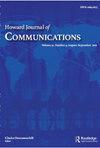亚裔美国人在2019冠状病毒病期间对社会耻辱的经历和看法
IF 0.8
Q3 COMMUNICATION
引用次数: 1
摘要
自2020年3月唐纳德·特朗普开始将新冠病毒称为“中国病毒”和“kung flu”以来,亚裔美国人因新冠病毒而遭受的社会污名化有所增加。污名对少数群体具有负面的社会和健康影响,如标签、回避、羞耻、厌恶和社会排斥。对健康的影响包括身体和精神疾病,以及健康差距的加速。本研究旨在了解这些生活经历和随后的应对策略。通过焦点小组,对17名亚裔美国人参与者进行了采访,以了解他们在大流行期间被污名化的经历。研究结果显示,他人的污名化行为和态度并没有阻止亚裔美国人遵循与COVID-19相关的健康指南,这可能是因为他们认为健康威胁很高。亚裔美国人的消费行为也发生了巨大变化,几乎所有东西都在网上购买(由于疫情和个人安全)。这种行为决策提供了对采取健康行为的复杂动机的见解,在这种情况下,社交距离可以同时作为避免与人接触的一种手段,因为害怕在公共场所成为污名化的受害者。本文章由计算机程序翻译,如有差异,请以英文原文为准。
Asian Americans’ Lived Experiences with and Perceptions of Social Stigma during COVID-19
Abstract It has been well documented that Asian Americans have experienced increased social stigmatization related to COVID-19 since Donald Trump began referring to the virus as the “Chinese virus” and “kung flu” in March 2020. Stigma has negative social and health impacts on minority communities, such as labeling, avoiding, shame, disgust, and social exclusion. The health impacts include both physical and mental illness, and the acceleration of health disparities. This study seeks to understand these lived experiences and subsequent coping strategies. Using focus groups, 17 Asian American participants were interviewed to understand their experiences with stigmatization during the pandemic. The findings reveal that stigmatized behavior and attitudes of others did not deter Asian Americans from following the COVID-19 related health guidelines, likely because perceived health threats were high. Consumer behaviors of Asian Americans also changed dramatically toward buying almost everything online (due to both the pandemic and personal safety). This behavioral decisioning provides insights into the complex motivations for adopting health behaviors, and, in this case, social distancing can double as a means by which to avoid people, for fear of becoming victims of stigmatization in public areas.
求助全文
通过发布文献求助,成功后即可免费获取论文全文。
去求助
来源期刊

Howard Journal of Communications
COMMUNICATION-
CiteScore
2.70
自引率
10.00%
发文量
23
期刊介绍:
Culture, ethnicity, and gender influence multicultural organizations, mass media portrayals, interpersonal interaction, development campaigns, and rhetoric. Dealing with these issues, The Howard Journal of Communications, is a quarterly that examines ethnicity, gender, and culture as domestic and international communication concerns. No other scholarly journal focuses exclusively on cultural issues in communication research. Moreover, few communication journals employ such a wide variety of methodologies. Since issues of multiculturalism, multiethnicity and gender often call forth messages from persons who otherwise would be silenced, traditional methods of inquiry are supplemented by post-positivist inquiry to give voice to those who otherwise might not be heard.
 求助内容:
求助内容: 应助结果提醒方式:
应助结果提醒方式:


